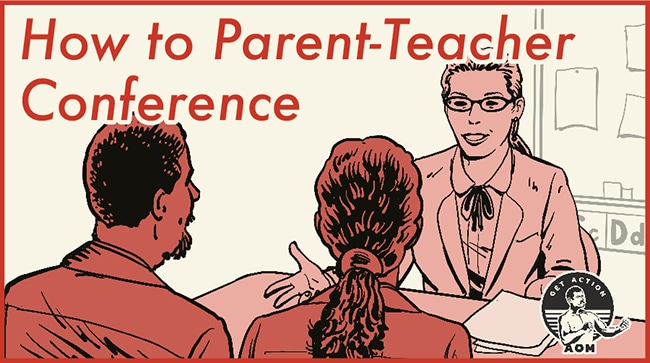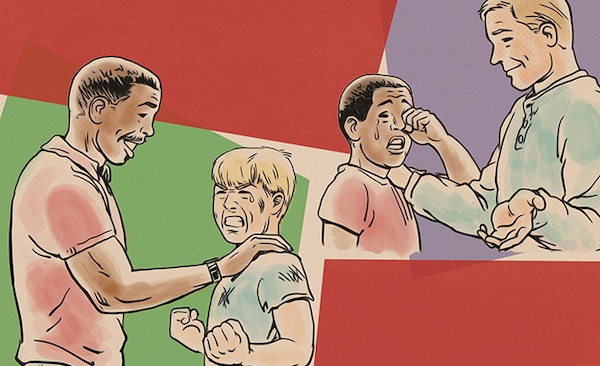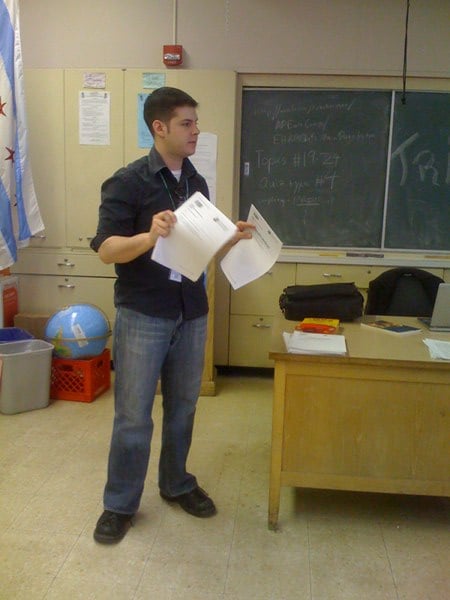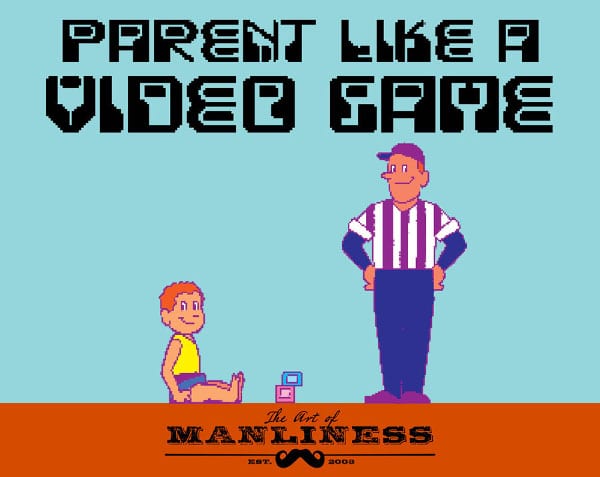
If you’re the dad of an elementary-aged kid, you’ll know that parent-teacher conferences are held a couple of times a year.
Perhaps because of their feeling of routine-ness, parents often kind of sleepwalk through these meetings. If they have a concern, they don’t think beforehand about how to bring it up productively. Or they simply don’t consider what they’d like to talk about until they’re stepping into the classroom, and when the teacher asks, “Do you have any questions for me?” they draw a blank.
I know I’ve typically approached conferences this way, and I’ve wondered what I could be doing to make more of these opportunities to meet with my children’s teachers. To get some tips on this front, I talked to Elle Fowler, an elementary school teacher here in Tulsa. Here’s what she shared.
Why You Should Attend Parent-Teacher Conferences
If you’re a dad with a busy work schedule, it may be tempting to relegate the responsibility of attending parent-teacher conferences to Mom. But you should try to be there whenever possible.
Elle says the majority of fathers come to PTCs, even when the parents are divorced, and this number has seemed to increase over her 14-year career as dads have gotten more engaged with parenting generally. This is great news, as kids whose fathers are involved in their education do better in school than kids whose dads aren’t. This seems to be particularly true when it comes to the dads of daughters; girls whose fathers are involved with their education thrive more academically while feeling less anxiety about school.
As a dad who’s attended all his kids’ parent-teacher conferences, I’ve found them beneficial in parenting my children. Kids are at school seven hours a day, and what they get up to is kind of a black box. Children show a different side of themselves in the classroom, and a PTC can illuminate what that side is like. These meetings can highlight strengths you never noticed your kid had, deepening your appreciation for them. Or they can disclose a struggle you didn’t fully recognize because you see your kid through the tinted glasses of parental love. Either way, a parent-teacher conference can give you a third-party perspective that can help you get to know your child better and understand what they need to reach their potential.
General Etiquette for Parent-Teacher Conferences
Be punctual. Respect the teacher’s and other parents’ time by arriving punctually to the conference and leaving on schedule. PTCs are typically scheduled in back-to-back blocks, and if you go over time, then the next conference will start and end late, as will the next. Don’t start a pile-up. If you need more time to talk, schedule a follow-up discussion for another day.
Dress nicely. Dress up a bit when attending a parent-teacher conference. It shows you respect education as a serious endeavor and teaching as a serious profession. You don’t have to wear a suit, but something in the smart-casual category like an Oxford and khakis works. My kids’ school has continued to offer the option of virtual conferences post-pandemic, and I don’t dress as nicely when the PTC takes place over Zoom, but I still try to not look like a slob.
Prepping for Parent-Teacher Conferences
Proper preparation is key to making the most of your parent-teacher conferences. By taking the time to gather relevant information and formulate thoughtful questions, you can ensure that the meeting is productive and addresses your concerns effectively. Here are some steps you can take to prepare for your upcoming conference:
Review your child’s academic work. Before the conference, review your child’s recent assignments, grades, and any feedback on that work the teacher provided. Take note of any areas where your child may be either struggling or excelling. If you have concerns about a specific assignment, write down what the assignment was and the score on it. “If you’re working with a teacher who sees 60+ students, they probably won’t know exactly what assignment you mean when you say something vague like ‘My kid got a bad grade on that test a few weeks ago.’ The more specific, the better,” Elle told me.
Talk with your child. Talk to your child about their experiences in school. If you’re going to a regular check-in conference, Elle recommends asking your kid the following questions:
- What’s something that’s going well at school that I can celebrate with your teacher?
- Is there anything going on at school that your teacher and I can work on a plan to help you with?
If you’re going in for a conference that’s being scheduled because there is a problem, ask your child how they’re seeing the issue. “Sometimes as parents, we see a problem and think, ‘Oh my gosh, this is a huge problem!’ but the child is not as affected by it,” Elle said. “So that gives us a kind of a recalibration for where we might want to go into that meeting and what our goals might be.”
Also, ask your child what they would change to resolve the problem. They might need to sit somewhere else in class so they’re not distracted as much, or maybe they need to work with another student more often. The more you can nudge your child to develop a solution, the more ownership they’ll feel for it and the more buy-in you’ll get.
Questions to Ask in a Parent-Teacher Conference
After doing a quick review of your kid’s academic work and talking to your child, take some time to develop some questions you want to bring up during your conference with their teacher. Elle recommends asking questions in three categories: academic progress, learning skills, and social-emotional development:
Academic Progress
- Where is my child excelling?
- What are the specific areas where my child may be struggling, and how can we support their improvement?
- Are there any resources or strategies you recommend for helping my child succeed in a subject?
Learning Skills
- Is my child turning things in on time?
- Do they stay organized?
- When you get assignments, does it look like their best work?
- When they’ve made a mistake on an assignment, do they revisit those mistakes?
Social-Emotional Development
- How does my child interact with their peers?
- Does my child have friends?
- Are there any social or emotional challenges my child is facing?
- How does my child handle frustration or setbacks?
- Are there any opportunities for my child to develop their social skills further?
One thing Elle noted on questions about social-emotional development is that if you have questions or concerns about your child being bullied or the like, privacy regulations in many public schools prevent teachers from sharing information about children that aren’t your own.
“As a parent, you can share names and details, and those names and details are really, really helpful for teachers and for principals and administration to hear if you’re reporting things that have happened,” Elle said. “But teachers and administration cannot report back to you what’s happened to that other child. As a teacher, I can say, ‘Our handbook has consequences for these events that you’re welcome to read.’ Which is my hands-are-tied-way of saying, ‘The child is receiving consequences, but I can’t tell you about them because it’s a breach of privacy.’ It’s strange and can be frustrating, but it’s the system that some teachers have to work in.”
Lead With Curiosity, Rather Than Blame
If you have a concern about how your kid is doing in school, it can be tempting to come into the conference with guns blazing. But introducing the issue that way only creates defensiveness on both sides of the table and prevents the discussion from being as fruitful as it could be.
Instead, Elle recommends raising your concern using this framework: “I’m concerned about X. Are you concerned about X?”
Sometimes, something you think is a problem, isn’t a problem, and the above framework gives the teacher the chance to explain that what you’re worried about is actually developmentally appropriate, or something your kid has struggled with, but is making sufficient progress in.
If your concern is also a concern for your child’s teacher, then the above framework allows them to affirm your concern and segue into what they’re currently doing to address it. If the teacher doesn’t explain what’s being done, follow up with “How can we work together to address this issue?”
Remember that you don’t know much about your kid’s school life, so rather than jumping to conclusions or making assumptions, give the teacher the opportunity to fill you in on needed context. At the same time, because the teacher doesn’t know much about your child’s home life, explain that side of things, and how it may be affecting how your kid shows up at school.
Instead of focusing on blame or fault, approach the conversation with genuine curiosity and a commitment to exchanging information, fostering a collaborative partnership, and finding solutions. Remember that you and your child’s teacher are on the same team!
Follow-Up
The parent-teacher conference is not the end of the conversation; it’s the beginning of an ongoing partnership between you and the teacher. Elle recommends this parent-teacher conference follow-up:
Email the teacher. If a PTC involved a particularly meaty discussion, send a follow-up email to the teacher, thanking them for their time and summarizing the key points discussed during the conference. This email serves as a record of the agreed-upon action plans and ensures that both you and the teacher are on the same page moving forward.
Communicate with your child. Share the outcomes of the conference with your child. Let them know what was discussed, any action plans that were put in place, and how you will be supporting them. Make sure to pass along the positive things their teacher shared with you!
Schedule additional meetings, if needed. If you feel that further discussions or updates are necessary, don’t hesitate to schedule additional meetings with the teacher. Ongoing communication and collaboration are essential for supporting your child’s educational journey.
Parent-teacher conferences are a time to create a collaborative relationship with your child’s teacher. With a bit of prep, you can get the most out of these meetings and get back to work helping your kiddo be awesome.







